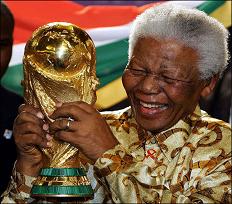World Cup Soccer In Africa: Who Really Wins?

South Africa is in the throes of unprecedented euphoria following the start of the 2010 FIFA World Cup. This should come as no surprise given the historic nature of South Africa’s hosting of an event of this magnitude, and the fact that the country will be the focal point of the world for the duration of the tournament.
That South Africa was considered to have the capacity to stage the tournament, and appears ready to do so, is plainly cause for national pride.
However, while, FIFA will receive more than twice the amount of television license fees than from the World Cup held four years ago in Germany, South Africa will not receive one cent of those revenues. The reality is that South Africa has engaged in expenditure that it could not afford and can never recover.
Given FIFA’s claims that it is time to give back to Africa, a simple principle should surely follow – that in conscience, FIFA accepts that it should not take more out of a tournament in Africa than it took out of Germany. An appropriate endorsement of that principle would be for FIFA to commit its enhanced returns in 2010 to the funding of South Africa’s new stadiums, thereby allowing for corresponding resources to be spent in areas of critical need.
When South Africa secured the right to host the World Cup, it did so on the basis that, subject to upgrade in certain cases, its established and world-renowned stadiums were adequate. Somewhere along the way, plans to use existing facilities were abandoned, as those in power determined that they should demonstrate that it could build bigger, better, more modern, and more expensive stadiums than any country on earth.
There can be no justification for these projects. In both Cape Town and Durban, perfectly good 50,000+ seat stadiums were deemed inadequate. In Nelspruit, home of a brand-new 48,000-seat facility, there are no sports teams in the area that have a following that would fill a quarter of the stadium.
South Africa’s existing stadiums were used for the Rugby World Cup in 1995 and 2009’s FIFA’s Confederations Cup. That tournament was declared by FIFA to be a success, confirming that South Africa had the capacity to host the World Cup.
The World Cup is essentially a television extravaganza. Fans glued to television sets across the globe do not care whether 50,000 or 70,000 spectators are watching a match at the stadium at which a game is taking place. Their interest is in the quality of the football. Does anyone really think that fans across the globe will be less inclined to tune in to watch a semi-final between Brazil and Spain, if that match were to be played at Cape Town’s Newlands and not at a bigger and newer facility?
Let’s be clear – this discussion is not about whether the World Cup should be held in South Africa – it is about the manner in which those in power have hijacked a national opportunity, in order to engage in expenditure (for the benefit of an elite minority) which was not required in order to host the tournament. Can there be any question that the new stadiums were built at the expense of South Africa’s poor, sick, homeless, hungry and uneducated?
For those who argue that the construction of the stadiums has provided jobs, there is a simple response: Had the same quantum of funds been invested in construction of hospitals, houses and school facilities, more workers would have been employed.
For the next four weeks there will, be a mood of exuberance and excitement. South Africans are entitled to relish in their status as hosts of one of the world’s major spectacles, and to enjoy the exhilaration of the moment. Few at this time are willing to consider that their joy is accompanied by nefarious activity which will be to their detriment. It is only when the caravans have moved on, and the dogs have stopped barking, that a process of rational reflection will begin. It remains to be seen how many will realize that they have had the wool pulled over their eyes, and that South Africa has inherited white elephants that will be a drain on public funds for years to come.
Craig Tanner is the director of the documentary “World Cup Soccer In Africa: Who Really Wins?” (http://www.whoreallywins.com)

